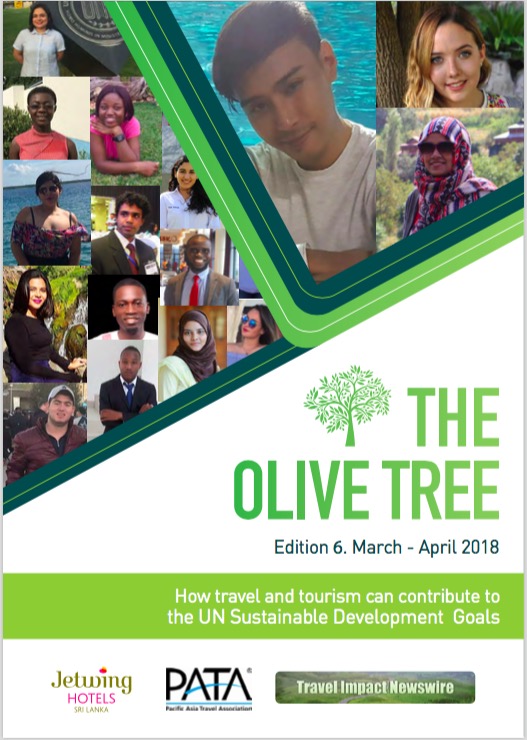13 Mar 2018
Millennials’ essays highlight need to disrupt the global tourism agenda
Bangkok – Perhaps the most important thing that struck me upon perusing the great essays sent in by young people for my competition was the yawning disconnect between their very perceptive views on the global status quo and the topics that figure on the agendas and programmes of global travel & tourism forums.
Embedded within the tapestry of these exceptional essays were opinions and concerns rarely heard at travel industry events. Reflecting the richness of their individual backgrounds and upbringing, all the young essay-writers discussed the impact of conflict, corruption, economic injustice, and much more, on what is widely claimed to be an industry of peace.
By contrast, these real challenges are never talked about at travel industry forums which, by and large, are becoming boring gatherings of people who spend most of their time preaching to the converted. Such mind-numbing content is badly in need of disruption based on my new definition of OTA (Openness, Transparency, Accountability) and 3D (Dissent, Debate, Democratise).
Although millennials are now prominently represented at travel & tourism events, their thought-leadership is restricted by self-censorship. Anything that could even remotely offend the private corporations and/or governments which have either hosted or sponsored the event is out of bounds.
I felt the time was right for an essay competition that would liberate young writers and allow them to think and speak freely.
Hence, these essays reflect a much more realistic and holistic view of the world and the inter-relationship between travel & tourism and the UN SDGs. Their “content is king” repertoire ranges from cruises ships to aviation and hotels. They discuss indigenous peoples, SMEs, women’s rights and migrants. They call for a focus on root causes and seek new designs for conventional business models.
At least one writer sees travel & tourism as being both a problem and the solution.
Overall, the 16 essays show that the emerging young generation has much more on its mind than just economic growth. This group of writers is only a microscopic tip of the iceberg. Millions more young people no doubt feel the same way.
Will the travel & tourism now listen to these voices?
It may be easy to dismiss these voices as being a little naive and idealistic. In the “real world”, it may be argued, when sustainability is prioritised against the immediate financial needs of meeting bank loan deadlines or quarterly stock market reports, it falls lower down in the pecking order.
But reprioritising and rebalancing such priorities is exactly what these essay writers seek. The conventional wisdom so far has been all about growth, growth growth and more growth. Driven by purely economic targets and enhancing “competitiveness”, travel & tourism has grown beyond its wildest dreams.
More growth is still to come. This goose will be laying golden eggs for decades.
But the law of unintended consequences has kicked in. Suddenly, “over-tourism” has turned up on global agendas. Clearly, some destinations have “over-eaten” and are suffering the consequences of their over-indulgence.
In fact, this applies to the world at large. The operating environment, built entirely around the mantra of generating growth, is fraught with instability. In the (very likely) event of a global crisis, the tourism bubble could burst with great intensity. And the ripple effect would be just as bad.
The young essay writers seek to address this big-picture status quo because they would all fall victim to a global crisis. Between the lines, they seek accountability from the outgoing generation of Baby Boomers for bequeathing them a dangerous, unstable world. After all:
• Who starts wars, incites geopolitical instability and religious/ethnic tensions?
• Who has a greater carbon footprint by nationality?
• Who makes the decisions that trigger financial crises?
• Who violates the rules and regulations they themselves make?
• Who wastes more energy, water and food on a per capita basis?
• Who violates human rights, silences dissent, jails opponents?
• Who funds fake news, and profits from safety & security fears?
• Who stashes billions of dollars away in secrecy-shrouded tax havens?
• Who tries to evade justice when wrongdoings are uncovered?
And perhaps most important:
• Who profits from all this man-made mayhem?
Certainly not the poor. Not by a long shot.
So does it make sense for the travel & tourism to be trying to alleviate poverty and enhance sustainability while a small minority of misguided people are creating conditions that do exactly the opposite? Does it make sense for these issues to remain off the table at travel & tourism industry forums?
This essay competition will continue to provide opportunities for millennials to speak out on issues that really matter to them, warts and all. The first round is over, and the second round will be announced soon.

